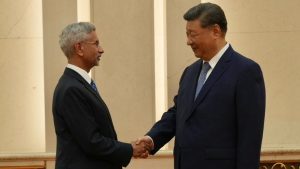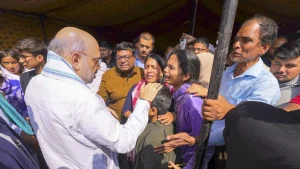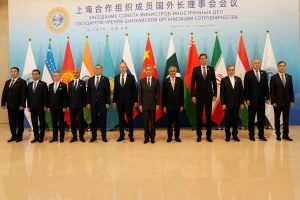New Delhi – External Affairs Minister S. Jaishankar delivered a powerful message during the Jaishankar SCO Summit proceedings in China, urging the Shanghai Cooperation Organisation to adopt an uncompromising stance against terrorism and extremism. The summit, held in Tianjin, marked a significant diplomatic engagement where India’s top diplomat emphasized the need for regional cooperation amid global disorder.
High-Level Diplomatic Engagement with Chinese Leadership

The Jaishankar SCO Summit began with a crucial meeting between the External Affairs Minister and Chinese President Xi Jinping in Beijing. During this bilateral engagement, Jaishankar apprised President Xi about recent developments in India-China bilateral ties, expressing appreciation for leadership guidance in managing the relationship.
The meeting, which included other foreign ministers from SCO member states, set the tone for the Jaishankar SCO Summit discussions. Jaishankar conveyed greetings from President Droupadi Murmu and Prime Minister Narendra Modi to the Chinese President, emphasizing the importance of maintaining diplomatic channels despite existing challenges.
Terrorism and Regional Security Take Center Stage


At the Jaishankar SCO Summit, the External Affairs Minister delivered a compelling address to the Council of Foreign Ministers Meeting in Tianjin, focusing primarily on combating terrorism and extremism. He reminded the gathering that the SCO was founded to combat the “three evils” of terrorism, separatism, and extremism, which often occur together.


The Jaishankar SCO Summit address specifically highlighted the April 22 Pahalgam terror attack as a graphic example of these interconnected threats. Jaishankar explained that the attack was deliberately conducted to undermine Jammu and Kashmir’s tourism-based economy while creating religious divisions, demonstrating how terrorism extends beyond immediate violence to economic and social disruption.
UN Security Council Response and Indian Action
During the Jaishankar SCO Summit proceedings, Jaishankar referenced the UN Security Council’s strong condemnation of the Pahalgam attack. The Security Council statement underlined the need to hold perpetrators, organizers, financiers, and sponsors accountable, bringing them to justice. This international response provided legitimacy to India’s subsequent actions.
Also Read: Jaishankar In China Visit Marks First Trip Since 2020 Galwan Clash
The Jaishankar SCO Summit discussions included references to India’s Operation Sindoor, launched on May 7 to target terror infrastructure in Pakistan-controlled territories. This operation, conducted in retaliation for the Pahalgam attack, triggered four days of hostilities before both countries reached an understanding on May 10.
Global Disorder and Stabilization Challenges
The Jaishankar SCO Summit address emphasized that foreign ministers were meeting amid considerable disorder in the international system, with increased conflicts, competition, and coercion occurring in recent years. Economic instability was also visibly rising, presenting significant challenges for regional stability.
Jaishankar told the Jaishankar SCO Summit gathering that the primary challenge was stabilizing the global order, de-risking various dimensions, and addressing longstanding challenges threatening collective interests. This comprehensive approach to regional security reflected India’s broader diplomatic strategy.
Afghanistan Situation and Regional Stability


The Jaishankar SCO Summit discussions included significant attention to Afghanistan’s situation, which has remained on the SCO agenda for an extended period. Jaishankar emphasized that regional stability compulsions were supported by longstanding concerns for Afghan people’s well-being.
During the Jaishankar SCO Summit, India committed to stepping up development assistance for Afghanistan, with Jaishankar stating that India would certainly contribute to international community efforts, particularly through SCO member collaboration.
Economic Cooperation and Transit Arrangements
The Jaishankar SCO Summit address highlighted the need for deepening collaboration through increased trade, investment, and exchanges. However, Jaishankar identified the lack of assured transit within the SCO space as a significant impediment to progress.


This absence of transit arrangements, discussed during the Jaishankar SCO Summit, undermines the seriousness of advocating economic cooperation. Jaishankar promoted the International North South Transport Corridor (INSTC), a 7,200-kilometer multi-mode transport project connecting India, Iran, Afghanistan, Armenia, Azerbaijan, Russia, Central Asia, and Europe.
Sovereignty and Territorial Integrity
The Jaishankar SCO Summit featured important remarks about cooperation being based on mutual respect, sovereign equality, and territorial integrity of member states. These comments appeared to reference China’s Belt and Road Initiative, particularly components passing through Pakistan-Occupied Kashmir.
Multipolarity and Future Cooperation


During the Jaishankar SCO Summit, Jaishankar emphasized that the world was moving toward greater multipolarity, not just through redistribution of national capacities but through effective groupings like the SCO. He stressed that the organization’s ability to contribute to shaping world affairs depends on member states coming together on shared agendas.
Bilateral China Relations Context
The Jaishankar SCO Summit occurred against the backdrop of improving India-China relations, with Jaishankar’s visit marking his first to China since border skirmishes in April-May 2020. Prior to the summit, he had met Chinese Foreign Minister Wang Yi, discussing good progress in normalizing relations while addressing border issues and trade measures.
This diplomatic engagement through the Jaishankar SCO Summit demonstrated India’s commitment to multilateral cooperation while maintaining firm positions on terrorism, territorial integrity, and regional security challenges.

